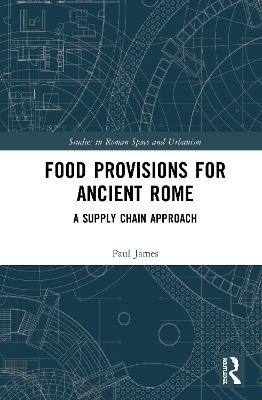
Food Provisions for Ancient Rome
Routledge (Verlag)
978-0-367-14339-8 (ISBN)
The subject matter delves into the wider supply of goods, such as wood and building products, to add further perspective to the breadth of the system managed by the Roman administration to ensure supply and political stability. It assesses the impact of strategic changes such as the introduction of water-powered milling technology and restructuring of the annona in this period, as well as administrative reforms. Evidence from ancient sources, both literary and epigraphic, along with relevant archaeological comparative evidence is used to develop a detailed supply model, including the mapping of warehouse management systems; port and river traffic co-ordination; quality control mechanisms and administrative structures. Unlike other contemporary studies, this model takes into consideration supply chain losses to correct the erroneous assumption that supply is equal to consumption. A product flow map from the source of supply to the consumer details the labour, equipment and infrastructure required at each stage, painting a graphic picture of just what an achievement it was for the administration to have maintained such a complex system over this long time period.
Food Provisions for Ancient Rome provides an in depth exploration of this topic that will be of interest to anyone working on the city of Rome under the empire, as well as those interested in imperial administration and logistics.
Paul James was awarded his Doctor of Arts by the University of Sydney, Australia, in 2017 where he is currently further researching the topic of the Roman Supply Chain in preparation for a series of papers and another book. His original qualification as a chemical engineer, and his extensive work in supply chain management, has meant that he is a recognised authority on this subject. The current volume on the food supply for Rome was prepared using a combination of his extensive modern workplace expertise in conjunction with his studies of the situation in antiquity.
1. Introduction 2. Supply Chain Management 3. The Model – Products, Area of Supply, Population, and Diet 4. The Products 5. Technology Development 6. Losses in the Supply Chain 7. Supply System Analysis – Core Inputs 8. Supply System Analysis - Infrastructure 9. Supply System - Operational Strategy 10. Conclusions
| Erscheinungsdatum | 15.01.2021 |
|---|---|
| Reihe/Serie | Studies in Roman Space and Urbanism |
| Zusatzinfo | 57 Tables, black and white; 21 Line drawings, black and white; 8 Halftones, black and white; 29 Illustrations, black and white |
| Verlagsort | London |
| Sprache | englisch |
| Maße | 156 x 234 mm |
| Gewicht | 453 g |
| Themenwelt | Geisteswissenschaften ► Archäologie |
| Geschichte ► Allgemeine Geschichte ► Vor- und Frühgeschichte | |
| Geschichte ► Allgemeine Geschichte ► Altertum / Antike | |
| Sozialwissenschaften ► Soziologie | |
| ISBN-10 | 0-367-14339-9 / 0367143399 |
| ISBN-13 | 978-0-367-14339-8 / 9780367143398 |
| Zustand | Neuware |
| Informationen gemäß Produktsicherheitsverordnung (GPSR) | |
| Haben Sie eine Frage zum Produkt? |
aus dem Bereich


